North Carolina 4-H Grows Future Voters
go.ncsu.edu/readext?1036613
en Español / em Português
El inglés es el idioma de control de esta página. En la medida en que haya algún conflicto entre la traducción al inglés y la traducción, el inglés prevalece.
Al hacer clic en el enlace de traducción se activa un servicio de traducción gratuito para convertir la página al español. Al igual que con cualquier traducción por Internet, la conversión no es sensible al contexto y puede que no traduzca el texto en su significado original. NC State Extension no garantiza la exactitud del texto traducido. Por favor, tenga en cuenta que algunas aplicaciones y/o servicios pueden no funcionar como se espera cuando se traducen.
Português
Inglês é o idioma de controle desta página. Na medida que haja algum conflito entre o texto original em Inglês e a tradução, o Inglês prevalece.
Ao clicar no link de tradução, um serviço gratuito de tradução será ativado para converter a página para o Português. Como em qualquer tradução pela internet, a conversão não é sensivel ao contexto e pode não ocorrer a tradução para o significado orginal. O serviço de Extensão da Carolina do Norte (NC State Extension) não garante a exatidão do texto traduzido. Por favor, observe que algumas funções ou serviços podem não funcionar como esperado após a tradução.
English
English is the controlling language of this page. To the extent there is any conflict between the English text and the translation, English controls.
Clicking on the translation link activates a free translation service to convert the page to Spanish. As with any Internet translation, the conversion is not context-sensitive and may not translate the text to its original meaning. NC State Extension does not guarantee the accuracy of the translated text. Please note that some applications and/or services may not function as expected when translated.
Collapse ▲In more than two dozen counties across North Carolina, youth ages 5-17 are joining their parents and neighbors in voting for their preferred candidates in the election this year.
Like their adult counterparts, the participants in North Carolina 4-H’s Kids Voting North Carolina program determine the issues most important to them, research candidates, and cast a ballot.
Unlike their adult counterparts, their votes will not be part of the official tally. They won’t impact any races at the national, state or local level. But that doesn’t mean their vote is not important. Far from it.
“It’s not about who we elect this year, but the fact that we’re building our democracy for the future,” said Carolyn Kreuger, NC State Extension program coordinator for Kids Voting Durham and team leader for Kids Voting North Carolina.
The program builds the civic knowledge of youth through an authentic election experience, and teaches them how to become informed voters when they are old enough to cast an official ballot.
“The goal is to learn by doing. That’s the 4-H approach,” said Jonathon Smith, 4-H agent and director of the NC State Extension center in Orange County. “Experiential learning is a key part of growing any skill. They have a mock voting experience, and when they turn 18 and they can vote in their regular elections, they know the process and they’re ready to do it.”
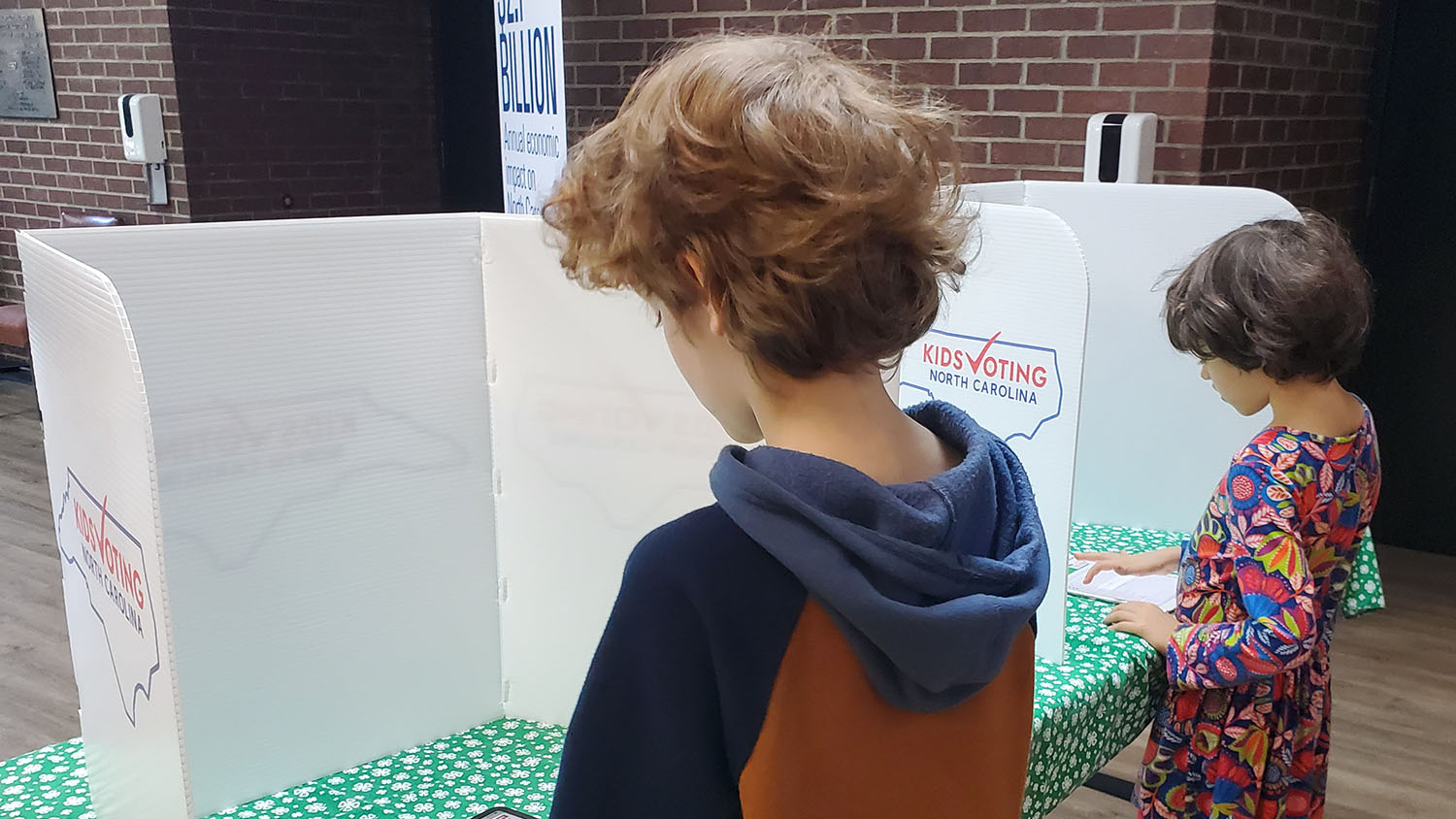
Rowan County 4-H’ers John and Sarah Tucker vote in 2023.
Kids Voting North Carolina also has present-day implications. Youth not only know how to become informed voters for the future, they also learn that they don’t have to wait until they turn 18 to become civically engaged.
“We want the youth to realize that they don’t have to wait until they’re 18 to be a citizen,” Kreuger said. “There are so many ways you can be involved and make a difference in your community. You can contact elected officials about what’s important. You can work with other youth to address an important local issue. You can help motivate adults in your community to do something about the issue that you care about.”
NC 4-H is the youth development program of N.C. Cooperative Extension, a partnership involving NC State and N.C. A&T State universities, along with federal, state and local governments. Extension experts deliver programming in all 100 counties across North Carolina and with the Eastern Band of Cherokee Indians. NC 4-H serves nearly 200,000 young people between the ages of 5-19 every year with activities including community and project clubs, special interest programs, school enrichment programs and afterschool programs.
Kids Voting Durham began in 1999 as a program of the Chamber of Commerce.
“This is something that’s solid and it’s foundational,” said Tom White, who was with the Durham chamber then and now helps with the program as the director of NC State’s Economic Development Partnership.
It became a statewide program with support from the North Carolina legislature. NC 4-H adopted the program in 2016 when it lost its funding.
“I was on an economic development workforce with [then-NC State Extension director] Rich Bonanno,” said Susan Jakes, associate leader for Community and Rural Development for NC State Extension. “Rich said we need to bring it into Extension, and 4-H was a natural fit.”
Kreuger wanted to completely immerse 4-H youth not only in the election process but in year-round civic engagement and interactions with elected officials when she established the program in Durham County.
“We would not have kids read about swimming for six months and their senior year take them to Lake Jordan and throw them in and say swim across,” she said. “Learning to vote, learning to be civilly engaged, learning to evaluate a candidate, is just like swimming. It’s a skill that you have to learn starting when you’re young. You have to practice it. You have to have hands-on ways of doing it. You have to be given that skill base.”
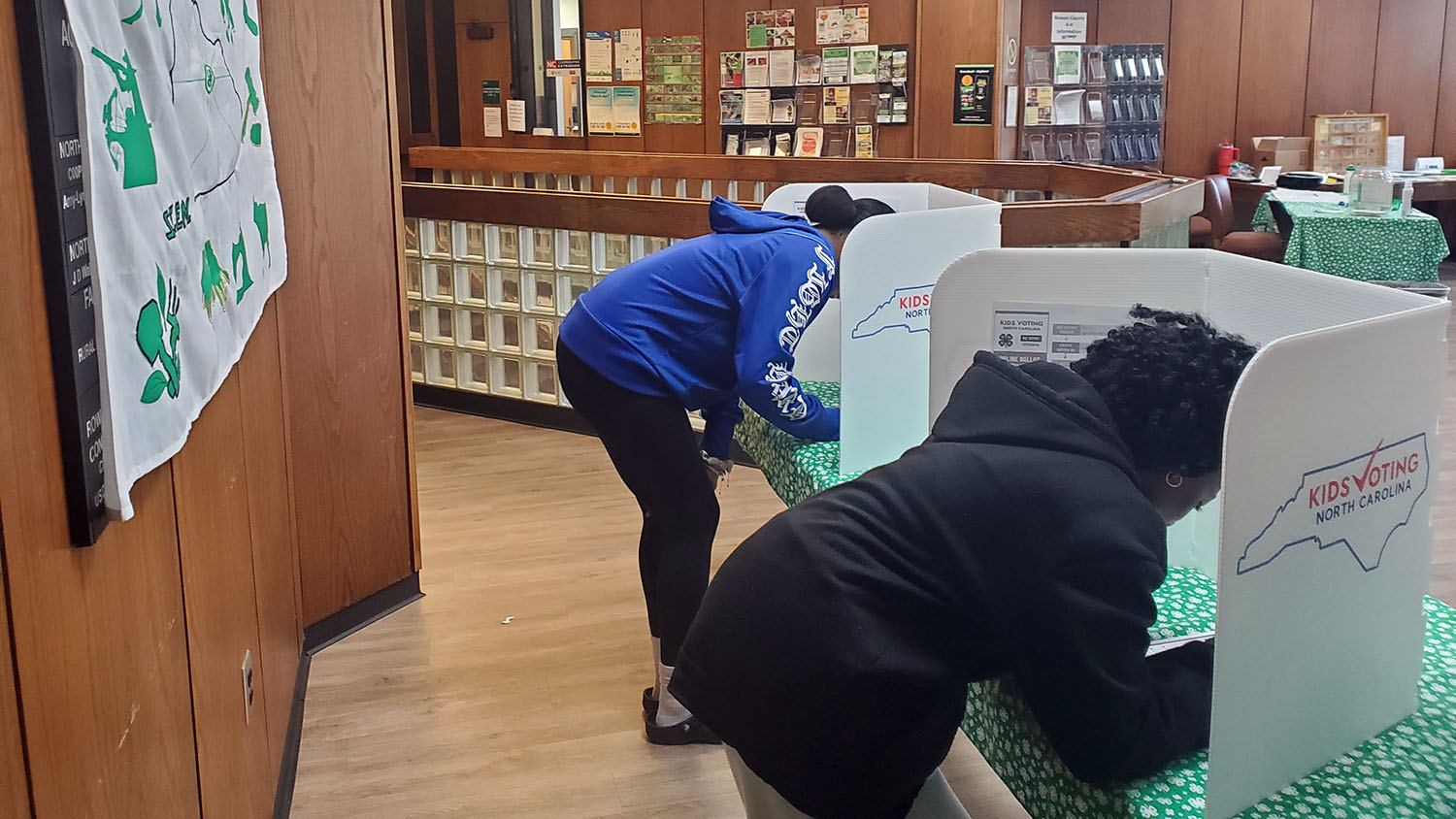
Two students vote in the kids-only election on iPads. Their high school civics teacher gave them extra credit for participating in the Kids Voting North Carolina election in Rowan County.
Voting can be overwhelming and confusing. There are more than two dozen choices on some ballots. Most people have ample knowledge for well-publicized positions such as president and governor. But what about down-ballot races? How can we make a well-informed choice for NC Auditor, for Court of Appeals, for NC State Senate or House, for county commissioners, city council, mayor, constitutional amendments and local bonds?
The 4-H youth in the Kids Voting NC program will be prepared to make informed choices when they turn 18. They learn about every office and issue on the ballot. They conduct research and develop a non-partisan voting guide that explains each one, and their importance to the local community.
“We want them to understand how important these local offices are and how much they impact their daily lives,” Kreuger said. “A big part of the educational piece is showing how things in your daily life — your parks, your streets, your schools, your trash pickup — are controlled by local and state officials.”
The youth then develop a questionnaire that is sent to people running for local and some state offices. The candidates take it seriously. There is almost 100% participation, not just in answering the questions but also in engaging with the students either online or in person.
“It really is a transformative experience for them to talk to local candidates and be taken seriously and feel like they made their views known,” Kreuger said.
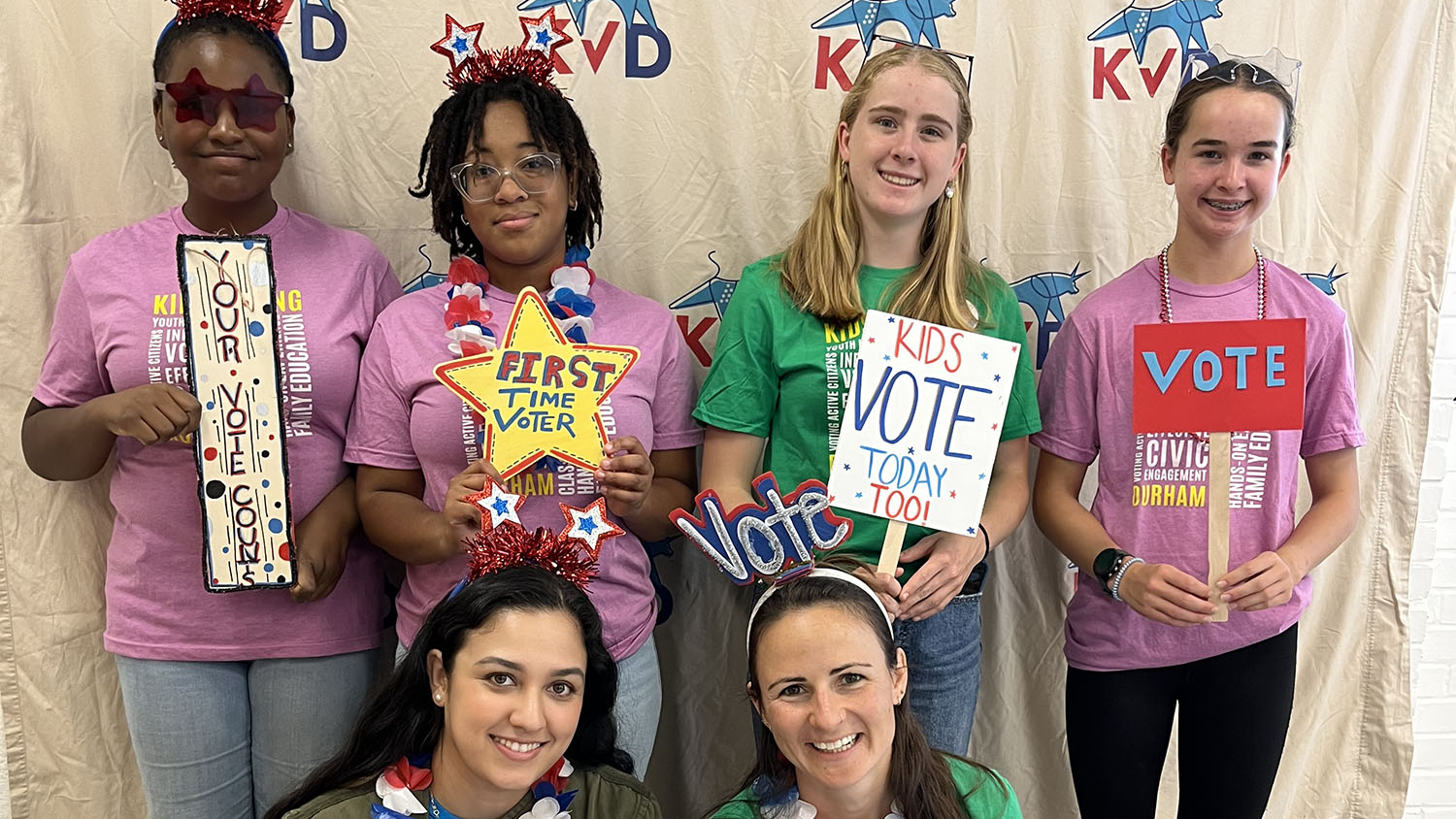
Youth in Durham celebrate after casting their votes in the Kids Voting North Carolina election in 2023.
The candidate questionnaires focus on issues important to young people, which aren’t necessarily the same issues prominent in campaigns aimed at adult voters.
“There’s some similarities and there are some differences,” said Smith, who also has the youth in Orange County develop questions for candidates. “One of the questions they included was what will you do or help do to bring inflation down? So I think students are listening to what the adults are talking about. But when we started talking about the main issues and concerns of the students, the first thing that came up was school safety.”
In Durham County, there’s also a fun question that humanizes the candidate.
“It’s things like what superpower would you have? What was your favorite movie or book when you were a little kid? What’s your favorite flavor of ice cream?” Kreuger said.
Simple and fun, but woe betide any candidate who doesn’t think through an answer.
“One of the first times we did this they asked what was your favorite flavor of ice cream?” Kreuger said. “One of the young ladies said, ‘I see here that you like Edy’s coffee ice cream. Why didn’t you mention a local business? Don’t you support your local businesses? Why aren’t those your favorite ice creams?”
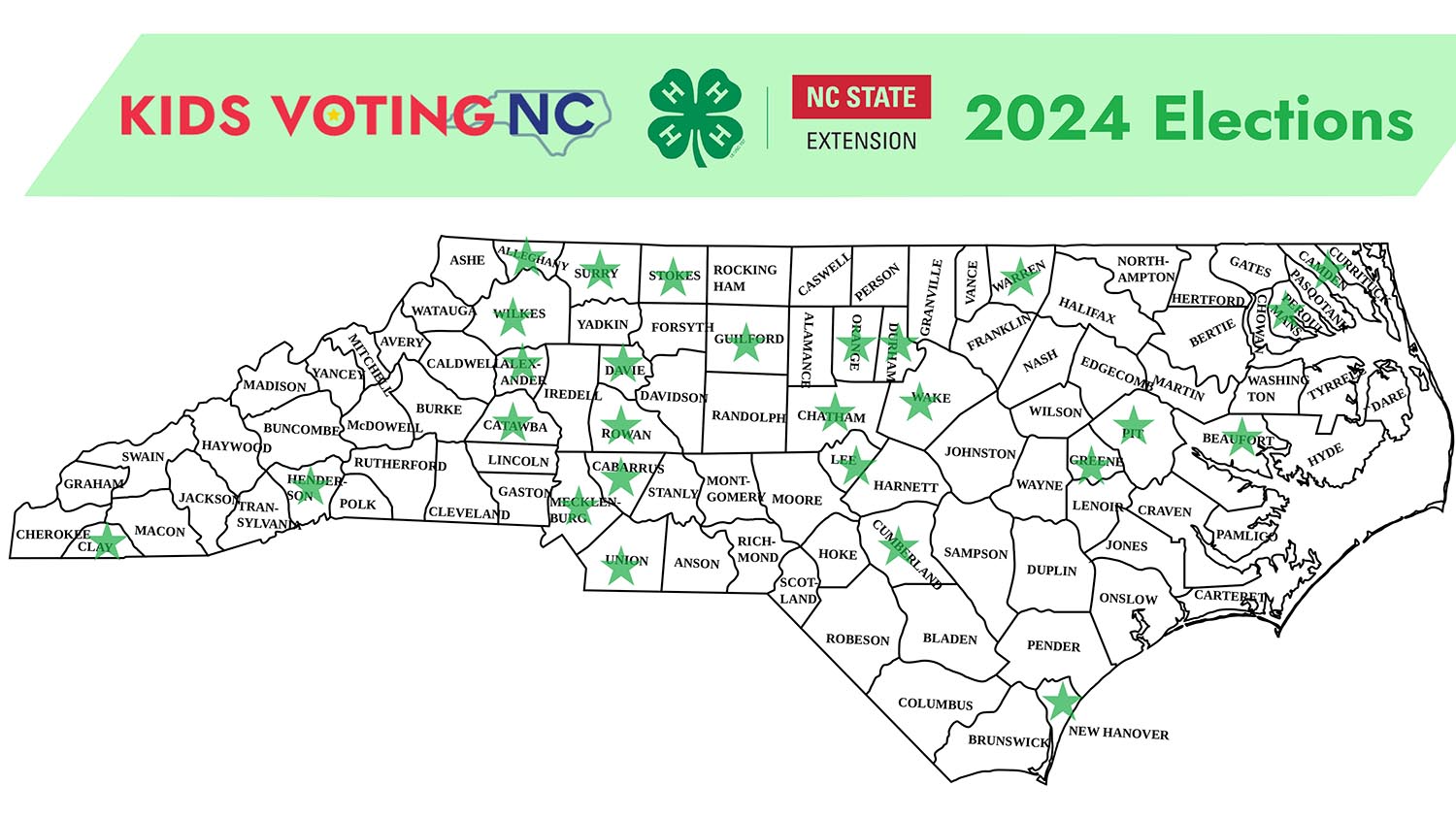
Youth in 27 counties are participating in Kids Voting North Carolina this year.
The program began to expand from Durham to other counties in 2022. Kids Voting Durham created a template for an election guide that could be adapted by 4-H groups and other organizations as a civic education tool.
“We provide a basic set of tools and materials,” Kreuger said. “We provide training in different civic activities and lessons. We offer it to schools and we offer it to community organizations. We want to give you the tools that you need to be able to do this out of the box. But we also want you to be able to customize it as much as you want to for your particular classroom, for your particular area.”
In 2022, 15 counties participated. This year it has grown to at least 27 counties. Several thousand youth are expected to participate and cast mock ballots.
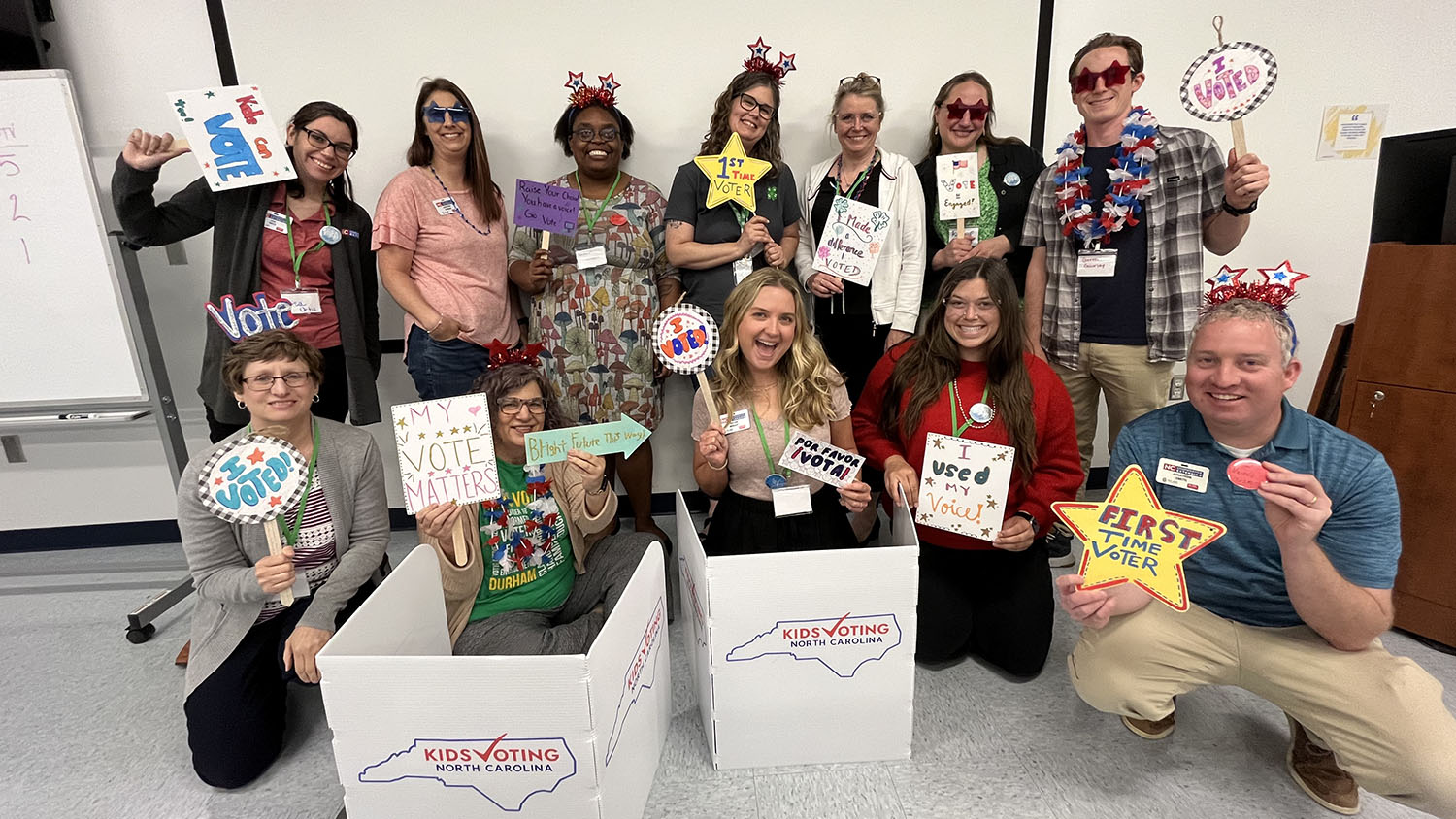
NC 4-H agents at a civic curriculum training session. The agents learn to present the program in a nonpartisan manner. They teach concepts such as converse, not convince, and dialogue, not debate.
Laura Allen, Extension 4-H agent in Rowan County, was an early adopter. This is the third time her youth have participated. She conducted the program during the municipal elections last year, agreeing with Kreuger that engaged and informed citizens should always participate because there’s no such thing as an off-year election.
“I think a lot of people forget about the power of a local election,” Allen said. “Those are the people in our hometown and in our communities, making our day-to-day decisions and impacting our day-to-day lives. And so I think those local elections are very important.”
The NC State Extension center in Rowan County is a polling place, so the youth vote in the same building as the adults. Allen sets up two booths in the lobby and the young voters cast their ballots on a tablet.
“I hope this gets them excited about wanting to vote in the future and that they see the value of having a voice in our electoral process,” she said. “I hope it encourages their parents to get out and vote, even if it’s not a presidential election year. I hope they learn that voting is important, that we have our voice heard through our voting process.”
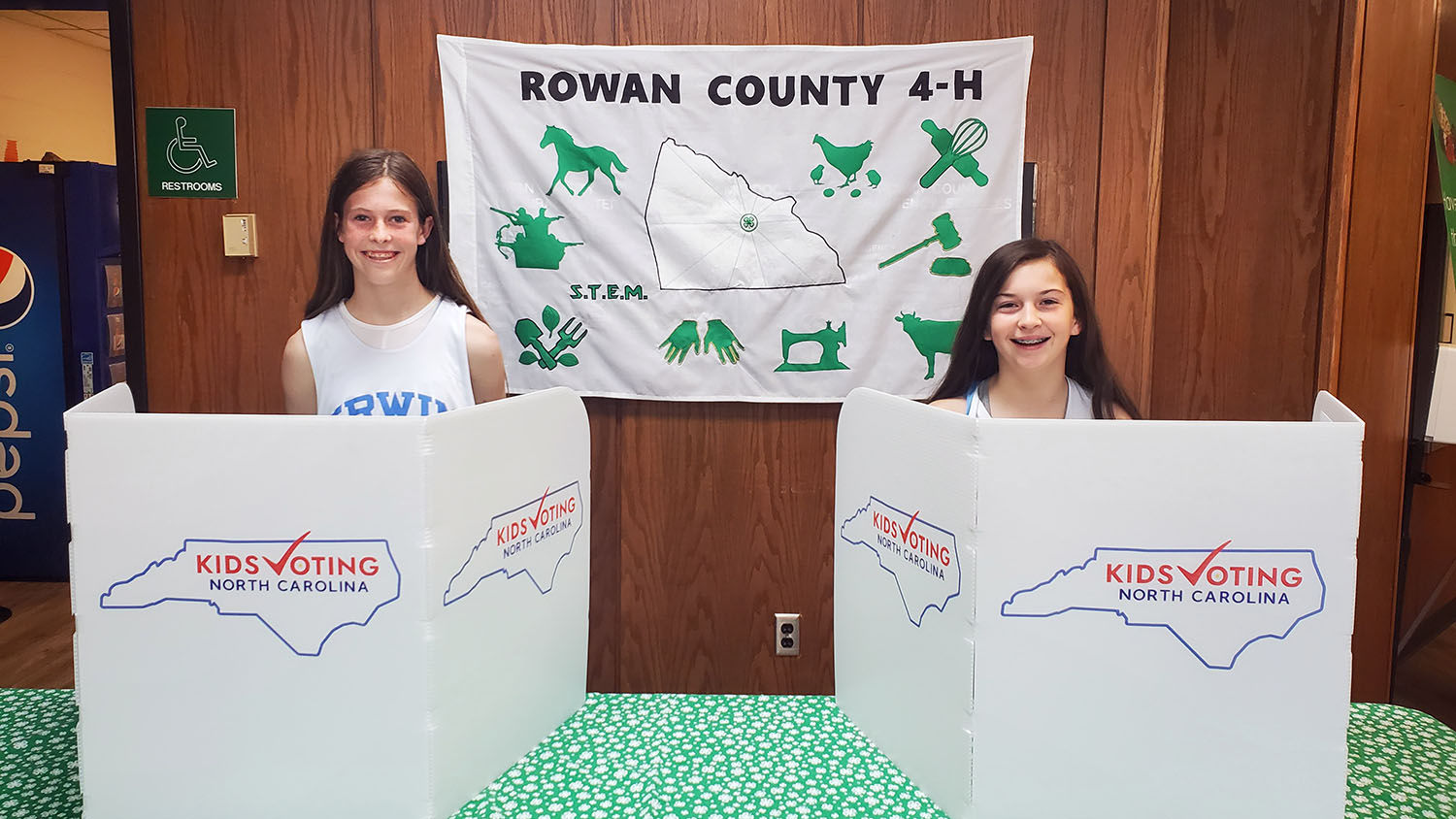
Friends Ashlyn Pfister (left) and Emory Stephens (right) voted in Kids Voting North Carolina elections in both 2022 and 2023.
Allen, Smith and other Extension 4-H agents have seen how Kids Voting NC teaches youth about the importance of the election process and gets them excited about voting in the future. Kreuger said there can also be a residual effect for the adults in their lives who are bombarded by an incessant stream of negative campaign ads and who can become cynical about politics and politicians.
“It’s a different lens to look at elections through,” she said. “And for a lot of people who are very election weary at this point, it’s certainly a much more hopeful and forward-looking lens.”

